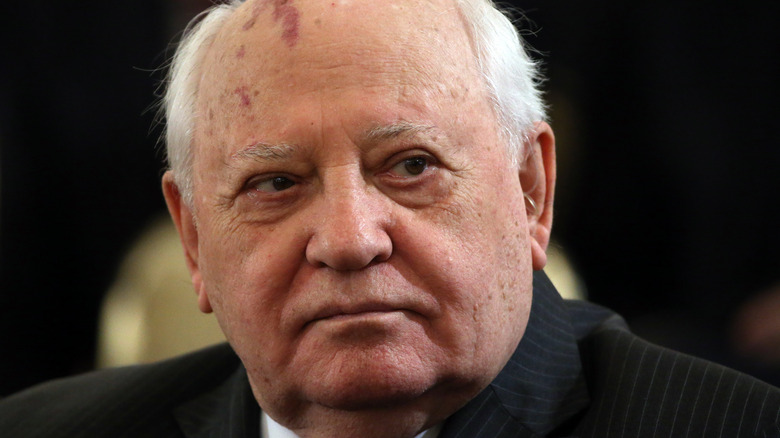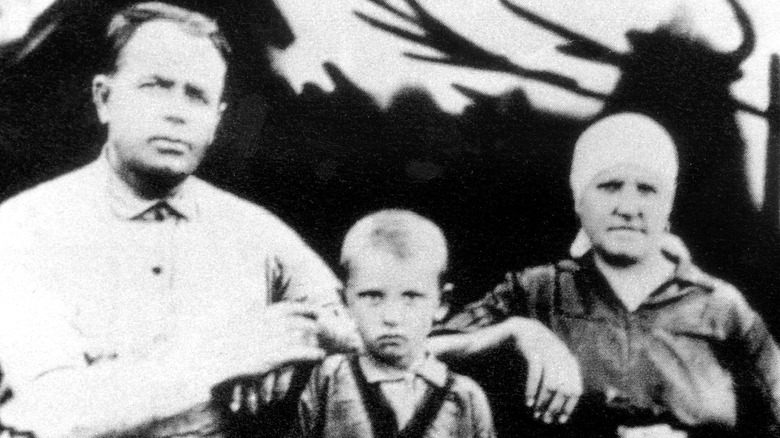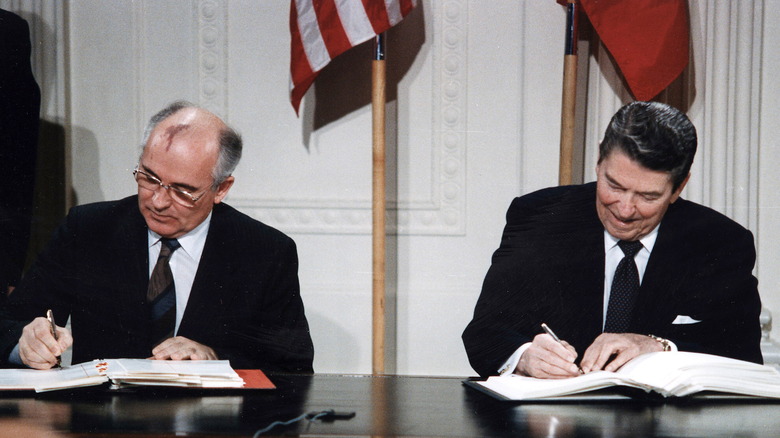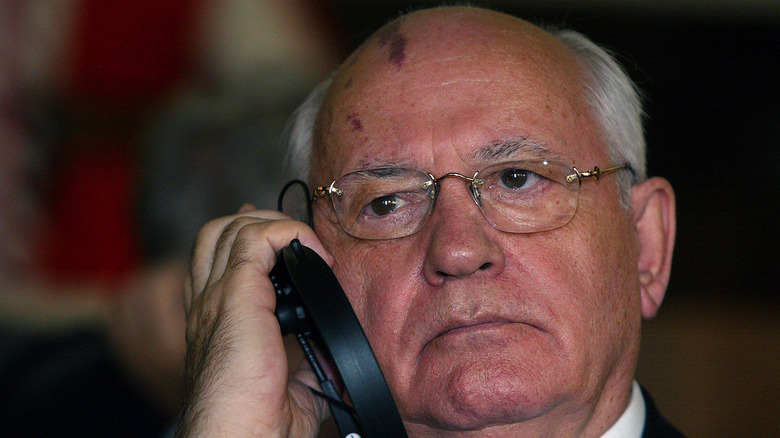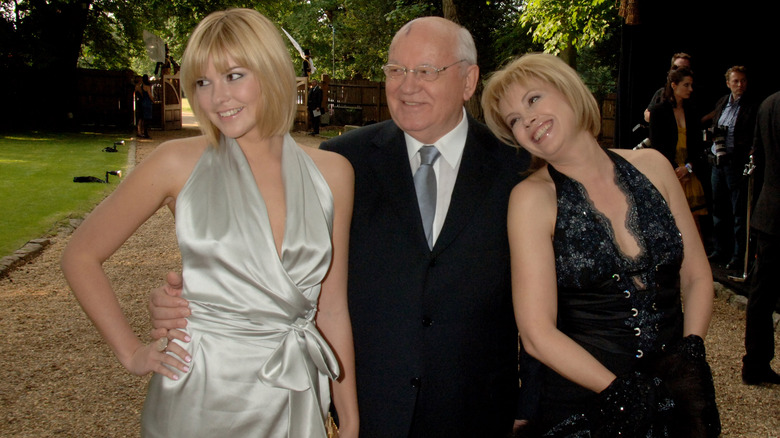The Death Of Mikhail Gorbachev Explained
The world was stunned to hear that former Soviet leader, Russian president, and one of the greatest statesmen of the age, Mikhail Gorbachev, died. He was 92 years old (via CNN). "Mikhail Sergeevich Gorbachev died this evening after a severe and prolonged illness," the Central Clinical Hospital said, according to RIA / Novosti Tuesday, according to CNN.
Gorbachev is survived by his daughter, Irina Virganskaya-Gorbacheva, who he had with his late wife Raisa Gorbachev, as well as a granddaughter, Ksenia Gorbachev, and great-grandchild, Anastasia.
Mikhail Gorbachev presided over one of the most dramatic eras of modern history, the fall of the U.S.S.R. from the mid-1980s to its complete collapse in 1991. Under his very non-communist policies of "perestroika," a democratic governmental and economic restructuring of Russian society, and "glasnost," extreme governmental transparency, Gorbachev pushed hard to modernize Russia and break free from the specter of its Stalin-era and Cold War-era Soviet past (via History).
From a humble Ukrainian-Russian peasant family
Mikhail Gorbachev was born in 1931 in the village of Privolnoye, Stavropol Territory, Russia, to a Russian-Ukrainian family of peasant farmers, as the Gorbachev Foundation describes. Gorbachev owed much of his identity, work ethic, and ideology to those early years working side-by-side with his father, mastering the usage and maintenance of combine harvesters. By age 17, Gorbachev had won the government's Order of the Red Banner of Labor for exceptional productivity. Like millions of other people, his family was a target of Stalin's "Great Purge" (1936 to 1938, via History). One of Gorbachev's grandfathers was arrested for "being a member of a counter-revolutionary Trotskyite organization," but not executed. The other was sent to a gulag in Siberia for not fulfilling his harvest quota and was considered a saboteur of the state.
Gorbachev showed great academic curiosity and took a liking to theater. He went on to enroll at Moscow State University, where he studied law and met his future wife, Raisa Titarenko. After graduating in 1955, Gorbachev got hired by the Stavropol Territorial Prosecutor's Office and began a three-decade-long slew of governmental jobs: First Secretary of the Stavropol City Komsomol Committee (1956), Second Secretary of the Stavropol Territorial Komsomol Committee (1958), First Secretary of the Stavropol Territorial Komsomol Committee (1961), First Secretary and Bureau member of the Stavropol City Communist Party Committee (1966), and so on. By 1985, he'd become General Secretary of the CPSU Central Committee, and in a position to shape governmental policies.
Steward of the dismantling of the U.S.S.R.
Without a doubt, Mikhail Gorbachev is best known for presiding over the dismantling of the former Soviet Union in the mid-to-late 1980s. As History chronicles, Gorbachev came into power in 1985 as the Soviet Union's final communist party leader, and in 1991 he left office as the Russian federation's first president. Boris Yeltsin's following, two-term presidency (1991 to 1999) transitioned directly to Vladimir Putin's iron-fisted reign. This, in turn, established some disturbing parallels between Gorbachev-era Russia and the Lenin-led Bolshevik Revolution of 1917 (described at History). Both events happened a mere 70 or so years apart, and involved the overthrow of a long-standing regime of centralized power in place of a "people's reign" that itself seemingly fell apart within a few scant years.
During his time in office, under policies of perestroika and glasnost, Gorbachev de-banned books, released political prisoners, incorporated free conversation and criticism of the government into mass media, and allowed individuals (not government) to own and operate businesses for the first time. He also signed agreements such as the Intermediate-Range Nuclear Forces (INF) Treaty of 1987, along with Ronald Reagan (pictured above), which abolished the use of nuclear weaponry in conventional warfare, and effectively ended the Cold War. In a final 1991 act, he created the Commonwealth of Independent States, a federation of sovereign nations overseen by shared governmental bodies: Azerbaijan, Armenia, Belarus, Kazakhstan, Kyrgyzstan, Moldova, Russia, Tajikistan, Turkmenistan, Uzbekistan, and Ukraine.
A true lover of Russia and democracy
To be fair, Gorbachev never espoused values of liberal democratic policies out of a love for the West. He did it out of a love for Russia, and to preserve his nation's future. Radio Free Europe quotes him as saying, "To stand for democratic principles and rule of law, exclude any possibility for usurping power or inconsiderate actions, that is what the society and state must be responsible for ... I believe that the democratic path of Russia's development is the only correct one, that only on this path can our country develop and solve any problems." Gorbachev believed in the will of the people above all else. He stated of Russia's transition to a democratic republic, "People did not want to return to the old order." He also stated that he supported Russia's 2014 annexation of Crimea because "most in Crimea wanted to be reunited with Russia" (via CNN).
Gorbachev was, in fact, vocally critical of the West throughout his career, especially in his later life. He described the "arrogance" and "triumphal mood" of the United States towards the end of the Soviet Union (via The Times), stating that the U.S. had been "rubbing its hands with glee" as they watched what was, to him and many Russians, a vulnerable period of disintegration. When Russia invaded Ukraine in 2022, Gorbachev attributed some of the blame to post-Soviet policymaking between Western, NATO-allied powers and nations in the former Eastern bloc.
An ardent family man and a lasting legacy
Mikhail Gorbachev was an ardent family man who, following the death of his wife Raisa Gorbachev in 1999 from leukemia, found himself surrounded by loved ones until his death (via The Washington Post). He and Raisa had one daughter together, Irina Virganskaya-Gorbacheva, whose daughter Ksenia Gorbachev went on to become heavily involved in the Raisa Gorbachev Foundation, an NGO set up by Mikhail devoted to the management of child cancer (via Daily Mail). Ksenia herself had a daughter, Anastasia, in 2008, making Mikhail a great-grandfather, and he and his late wife the progenitors of three subsequent generations of Gorbachev women (via The Gorbachev Foundation).
In the years leading up to his death, Mikhail Gorbachev experienced a number of health scares. In 2014 he was hospitalized and "fighting for his life" while "hooked up to a monitor," as he put it (via the Independent). At the time, he said that his overall health was in a state of deterioration. In 2019 he was hospitalized for pneumonia, and released after a couple of days (via NDTV). From 2013 onward, in fact, Gorbachev had been repeatedly forced to deny rumors that he was, indeed, not dead (via the Independent).
Now that he has died, Gorbachev leaves behind an incontrovertible historical legacy, regardless of anyone's personal opinion of him. As "one of the greatest reformers of the 20th century" (via Radio Free Europe), he changed the face of Russia, and by extension the world, forever.
